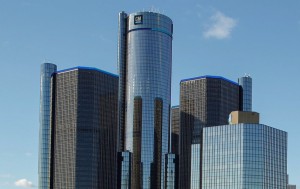
GM has called into two banks to help it decide what to do about Harry Wilson's demand to buyback $8 billion in shares.
General Motors’ hard-won “investment-grade” credit rating could be at risk if a group of dissident investors succeeds in enforcing demands for an $8 billion buyback of the company’s stock.
Harry Wilson, who once held a spot on the Obama administration’s auto task force, leads a group of four hedge funds that control 2% of GM’s stock that want to see the program implemented.
Wilson, who is also seeking a seat on the board, contends GM is overcapitalized and has excess cash that should be returned to shareholders and by extension boost the value of the company’s shares. The automaker with its “fortress balance sheet approach” has about $25.2 billion in cash and securities plus another $12 billion in credit, according to SEC filings.
The proposal has GM searching for an appropriate response. The automaker, which only regained an investment grade last autumn, has called on two of its major banks – Goldman Sachs and Morgan Stanley – to advise it on how to deal with this push by Wilson and his supporters for a buyback.
The board approved an increase in the company’s dividend, despite the $3 billion cost of various recalls over the past 12 months, with hopes that might pacify other investors who would like to see a quicker payback.
In the interim, ratings firms suggest an aggressive buyback could hurt GM’s current credit rating, which is still only one notch above junk grade. Standard & Poor’s called Wilson’s proposal “detrimental to credit quality“ and suggested it would put GM’s rating up for review if the buyback is approved.
(GM board unlikely to bow to hedge fund demands. For more, Click Here.)
GM lost its investment grade rating in 2005: a full three years prior to the crisis that precipitated its bankruptcy and eventual bailout by the U.S. Treasury Department. The downgrade of GM’s once sterling credit rating into junk territory followed a long series of minor downgrades that tracked the company’s steady loss of marketshare over the years.
(Click Here for details on Harry Wilson’s demands of GM.)
The automaker’s long-term plans included having a large stockpile of cash to allow it invest in product development, even when sales are stagnant, which isn’t expected to happen anytime in the next couple of years.
(To see more Chevy’s plans to introduce the Bolt, Click Here.)
Since there is time to continue stockpiling cash, it makes sense to return some of it to shareholders, Wilson contends. The hedge funds, Taconic Parties, Appaloosa Parties, HG Vora Parties and the Hayman Parties, have been speculating in GM shares for the better part of two years, according to an attachment to Wilson’s letter to the board of directors.
While the buyback is likely to increase the value of shares, the automaker is staring down an eventual slowdown in auto sales as well as an unknown cost related to its ignition switch recall that is responsible for at least 56 deaths. The buyback could adversely impact the ratings for GM Financial, GM’s new Texas-based finance subsidiary, which GM believes has the potential to produce additional revenue and earnings.

Ya gotta love it… The auto makers get in a dire financial situation due to mismanagement. When they finally learn their lesson and retain a reasonable cash balance, then those who look to profit, want GM to buy back stock to artificially boost the stocks value beyond fair market.
“Investment grade”? According to the same buffoons that gave Goldman’s c.d.s. a AAA rating? Then again, why would they take advice from the “investment” company that collapsed the economy, anyway?